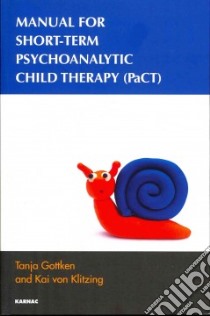- Libreria
- >
- Libri in lingua
- >
- Medicina
- >
- Psicoterapia
Manual for Short-term Psychoanalytic Child Therapy Pact - 9781780490366
Un libro in lingua di Tanja Gottken Von Klitzing Kai edito da Karnac Books, 2013
- € 37.60
- Il prezzo è variabile in funzione del cambio della valuta d’origine
Brief Psychoanalytic Child Therapy (PaCT) comprises 20-25 psychotherapeutic sessions conducted in alternating settings (parent-child together, child and parent, individually). During these sessions, therapist, parent, and child seek to identify and modify the core conflictual theme underlying the relationship, which we term the “Triangle of Psychodynamic constellations” (ToP).
Despite the challenges of manualizing psychodynamic treatments without purging them of their complexity, the authors have sought to create PaCT in manual form. They thus hope to ease the application and accessibility of psychonanalytic treatments for a greater range of settings (e.g. utility for trainees) as well as help systematically evaluate the treatment’s outcome in controlled trials. Their treatment approach is rooted in the assumption that children with affective disorders fail to express their aggressive impulses interpersonally in their primary caregiver-relationships, but instead turn them inwards against the self. This induces an intrapsychic conflict whereby the object is spared, at the expense of (persecution of) the self, thereby disrupting the latter’s developmental progress. They invoke both early models of depressogenesis by Karl Abraham, Sigmund Freud and Sandor Radó, stressing the role of object-loss, dismay, and ensuing anger, as well as more recent complementary formulations, such as that of Mentzos (2006) spanning the three conflictual areas of “real and psychic object loss”, “turning of the aggression against the self” and the “disruption of narcissistic regulation”. Likewise, Blatt’s (1974, 2005) theory on adult depression (anaclitic vs. introjective) is embedded within the approach, which suggests that depression may signify either conflictual or structural aetiologies.
Informazioni bibliografiche
- Titolo del Libro in lingua: Manual for Short-term Psychoanalytic Child Therapy Pact
- Lingua: English
- Autori : Tanja Gottken Von Klitzing Kai
- Editore: Karnac Books
- Collana: Karnac Books (Paperback)
- Data di Pubblicazione: 30 Ottobre '13
- Genere: PSYCHOLOGY
- Pagine: 311
- Dimensioni mm: 228 x 146 x 0
- ISBN-10: 1780490364
- EAN-13: 9781780490366


